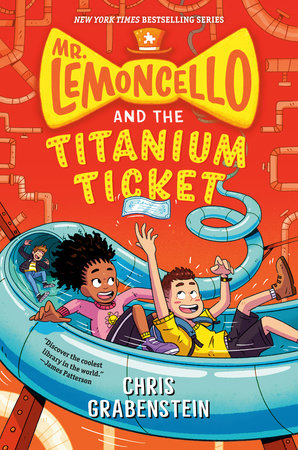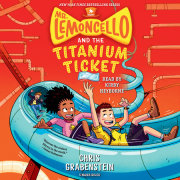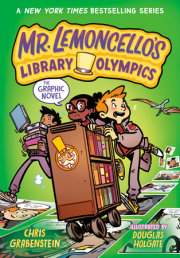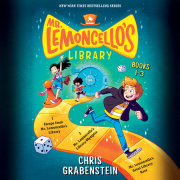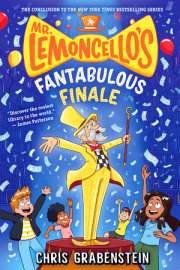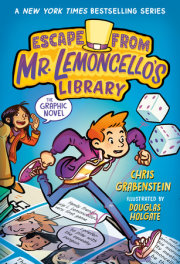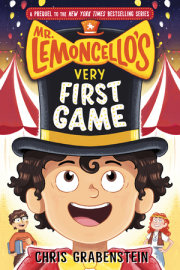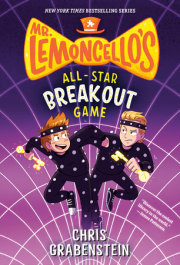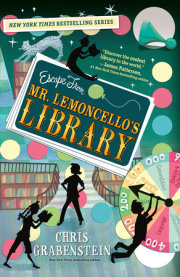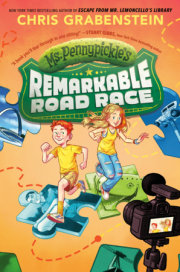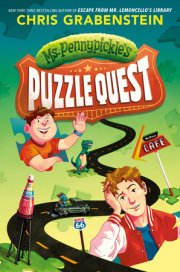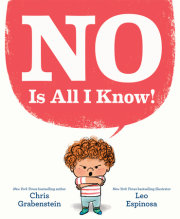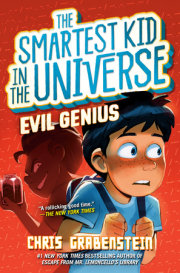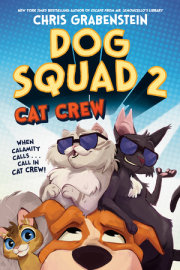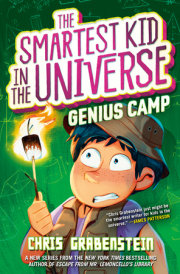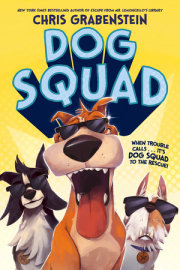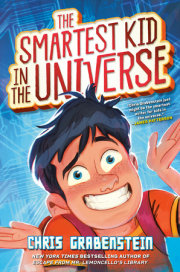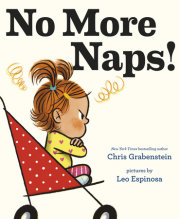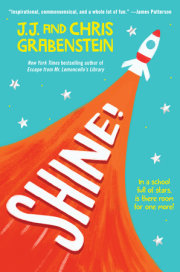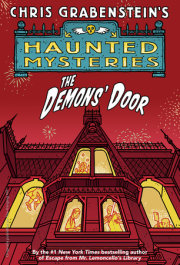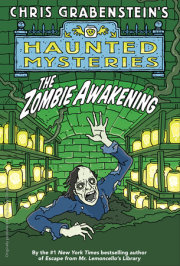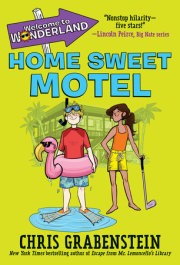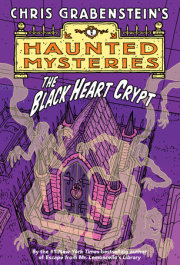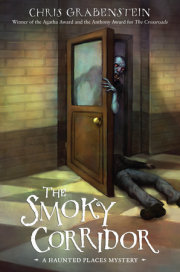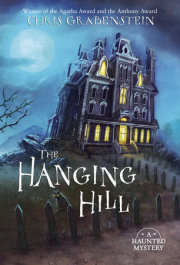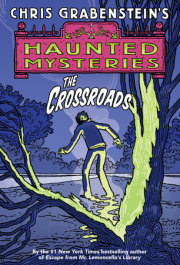1
It was after nine o’clock on a school night.
Simon Skrindle, a short (and nearly invisible) seventh grader at Hudson Hills Middle School, had just crept out of the dark forest near the Lemoncello Gameworks Factory.
He was a twelve-year-old on a mission.
He was alone. Simon didn’t have many friends, especially not the kind who’d go on an adventure with him, sneaking through the woods late at night.
And this was a BIG adventure.
Simon was going to be the first to see what secrets were hidden inside the new building behind Mr. Lemoncello’s factory!
For twenty-five years, Luigi L. Lemoncello, the world-famous game maker, had manufactured his games inside the fantastical castle fortress of the Lemoncello Gameworks--a sprawling factory perched high on a hilltop overlooking the Hudson River. Its four corner towers looked like upside-down snow cones made out of lemon-yellow oval bricks. The pinnacles at their pointy tips were topped with cello weather vanes. Sculptures of game pieces served as gargoyles. The factory’s water tower was a one-million-gallon lemon on stilts. During the day, enormous smokestacks puffed out billowy clouds of steam in the shapes of animals or famous faces. Simon loved seeing the Abraham Lincoln and George Washington clouds drifting across the sky over the factory every Presidents’ Day. And the bunnies at Easter time. People came from all over to take selfies with the cartoon clouds. Another pipe let out enormous rainbow-colored bubbles every weekend.
There was also a giant ball-pit moat surrounding the whole factory and you could only enter when the drawbridge was lowered. Workers had to know the secret password and shout it into an enormous curled horn that looked like something out of a Dr. Seuss book.
And for the past five years, Mr. Lemoncello had spent a ton of money and time constructing a top-secret new building close to his factory fortress. All the work had been done behind forty-foot-tall plywood walls (painted yellow, of course). The workers and contractors and architects had been sworn to secrecy about what they were doing on the other side of that wooden barricade.
Rumors buzzed around the town, anyway.
One guy at school, Jack McClintock, whose dad was the head of security at the Gameworks Factory, said the new building was nothing but a fancy warehouse for “storing junk.” A girl in Simon’s science class, Soraiya Mitchell, whose father was the plant manager, said the new building would be filled with “amazing twenty-second-century game-making technology.”
Basically, nobody knew what was inside the new building. But everybody wanted to find out. Kids at school were even daring each other to “bust in.”
No one had the nerve to try.
Then, two weeks ago, the yellow plywood walls came down to reveal a modern, three-story silver box with mirrored walls. At night, those walls reflected back the twinkling black sky.
Plywood down, the secret glass building was now surrounded by three rings of chain-link fences, set up in concentric circles. Each fence had a locked gate, which could be reached by following a footpath from the factory parking lot past a bed of yellow and orange flowers spelling out the word “gesundheit,” then on through rows of topiary--evergreen shrubs trimmed to resemble Mr. Lemoncello in various poses (juggling, dancing, tipping an egg timer, balancing a pair of giant dice on his nose). Some kids at school said the fences were electrified, too.
Security for the new building was tight. Super tight.
Simon’s grandfather, who hated all things Lemoncello, swore that “the batty old bazillionaire is installing an army of robots in that new building so he can fire all the factory workers!”
Simon’s grandpa, Sam Skrindle, had no proof for his theory. It was more or less a wild guess.
That’s all anybody in Hudson Hills had. Wild guesses and theories based on even wilder rumors.
So Simon decided he would be the first one to actually step foot inside Mr. Lemoncello’s secret new building. He’d show the kids at school. He’d take their dare. He’d also take a few pictures with his phone to prove that he’d done it.
Besides, Simon had what his grandmother called “an insatiable curiosity.” He loved tearing things apart just to see how they worked. And then he loved putting them back together.
Usually, he could.
Except that one time with his grandmother’s blow-dryer. When Simon put it back together, the thing sucked air in instead of blowing it out. It inhaled her hair like a hungry, hungry hippo slurping spaghetti.
It took a week for the bathroom not to smell like a charred wig.
Fortunately, his grandmother wasn’t upset. She laughed and said, “Yep, just like your father.”
Simon’s grandparents were some of the few adults in the whole town who had never, ever worked at the Gameworks Factory. Mr. Lemoncello was the main employer in Hudson Hills. Had been for twenty-five years. Everybody said he paid the best wages in the world and had the best benefits, too--medical, dental, free books, a rock climbing wall, two zero-gravity rooms, plus an indoor archery range and a bowling alley.
Everybody in Hudson Hills loved the zany game maker.
Everybody except Simon’s grandfather, who said the meanest, nastiest, ugliest things about Mr. Lemoncello--at the grocery store, at the hardware store, at the barbershop, in letters to the local newspaper, even after church on Sundays.
Sam Skrindle was the town kook.
Maybe that’s why Simon didn’t have very many friends.
And why he had to break into the secret building!
If he did, he’d prove to all the kids at school that not everybody in Hudson Hills named Skrindle was a total joke.
2
Simon scurried across the moonlit lawn, past a topiary trimmed to look like Mr. Lemoncello floss dancing, and made it to the pathway, which he followed to the first of the three locked gates.
There was a small metal box mounted on it. Inside the box, Simon discovered a thumbprint scanner, a video screen, and a keypad. He figured the scanner was for authorized workers. Everybody else probably needed to tap in some kind of security code to open the lock.
A recorded voice said, “Greetings and salutations!”
It was Mr. Lemoncello himself!
Mr. Lemoncello didn’t visit Hudson Hills all that much but Simon recognized his voice from TV commercials and the All-Star Breakout Game on the Kidzapalooza Network.
“To enter this supersecret zone,” the recorded voice continued, “puzzletastic skills must be shown!”
A riddle scrolled across the video screen: There are 100 bricks on a plane. One falls off. How many are left?
Simon thought about that. He wondered if it was a trick question. It couldn’t be this easy. Then he shrugged and tapped 99 on the keypad.
A flashing Correct! filled the screen and dissolved into animated fireworks. The pixels rearranged themselves to create a new question: What are the three steps for putting an elephant into a refrigerator?
What? Simon thought. He knew Mr. Lemoncello was wacky, but this question was just plain weird.
“It’d have to be a jumbo-sized fridge,” he mumbled. Then he thought out the logical steps. One, open the door. Two, put the elephant in. Three, close the door. It made sense, so he typed those three steps on the keypad.
“Oh, what fun!” boomed Mr. Lemoncello’s recorded voice. “You have opened lock number one!”
There was a solid CLUNK of a latch springing free. The gate creaked open an inch. Simon pushed it the rest of the way and hurried down the yellow brick walkway to the second gate, where he found a second puzzle box.
Another question glowed on its screen: What are the four steps for putting a giraffe in a refrigerator?
Simon started to type in the same answer that he’d just given for the elephant/fridge question.
Then he stopped.
That was three steps. This question asked for four.
He needed an extra step. He rubbed the short, fuzzy hair on top of his head as if it were a lucky tennis ball. Sometimes head rubbing helped him think. So did humming.
What if it’s the same refrigerator? he asked himself. He shrugged again. He took a risk and typed in his answer, even though it felt more like a guess: One, open the door. Two, take the elephant out. Three, put the giraffe in. Four, close the door.
The screen remained frozen for a second.
Then it burst into those Correct! fireworks again.
The dots pulled themselves together to form another question: A lion was having a party and he invited the other animals. All of them came except one. Which one was it?
“How should I know?” muttered Simon. “There are so many animals in the jungle. . . .”
He heard a whir overhead.
It was a security camera, swiveling slightly on its post. One more swivel, and its lens would be aimed directly at Simon.
Panicking, he typed the first and only thing to cross his mind: The giraffe. Simon figured it couldn’t come to the lion’s party because it was stuck in the refrigerator.
He closed his eyes and hit the enter key.
“Well, yippee-ki-yay and husker dü!” cried Mr. Lemoncello’s voice. “You have unlocked gate number two!”
The second gate popped open. Simon couldn’t believe his luck. He raced to the third and final gate just before the overhead security camera completed its pivot to catch him. He was so close to the building, he could see his reflection in the mirrored glass walls. He flipped up the lid on the lockbox and read the riddle he knew would be waiting for him: A lady crossed a crocodile-infested river and survived. How?
This question seemed to have nothing to do with any of the earlier ones. Maybe Simon’s grandfather was right. Maybe Luigi L. Lemoncello was just a madman with a mangy mustache.
Or . . .
Maybe the new question did have something to do with the old ones.
Simon’s fingers danced across the keypad. There weren’t any crocodiles in the river, he typed. They were all at the lion’s party.
He was correct. Again.
Two words illuminated the screen: Final Question.
This was it. If Simon answered one more question correctly, he’d be in. He’d be the first unauthorized person in all of Hudson Hills to see what was inside the new top-secret building!
Up came the final puzzler: The lady waded back across the river and died. How?
Simon’s cranium felt like it might explode.
The crocodiles could’ve left the party early. The river could’ve turned into quicksand. There really weren’t enough facts to work with.
Or were there?
Maybe all the riddles were connected!
Maybe the final answer would come from that ridiculously easy first question.
Simon took a deep breath. He was ready to play his hunch.
The brick from the airplane fell out of the sky and conked her on the head, he tapped on the keypad.
“Congratulicitations to thee!” declared the prerecorded Mr. Lemoncello. “You have solved the riddles for gate number three.”
Simon didn’t hear the familiar metallic CLUNK of the lock opening.
He pushed against the gate. The chain-link fence rattled but the gate didn’t budge.
“You made it oh so far,” the voice continued. “So be oh so proud. However, access to the general public is not yet allowed. Thank you for playing. Your memories are your treasures. It’s time for me to activate maximum security measures!”
3
Freaking out just a little, Simon jiggled the third gate again.
It still wouldn’t open. He heard the double KA-THUNK and WHOOSH of what sounded like a pair of catapults.
FWUMP!
Direct hit.
Ew!
The hurling machine had clobbered Simon with some kind of flying beef potpie loaded with gravy, potatoes, and slimy meat chunks.
He heard something creaking overhead. Looking up, he saw two rubber buckets perched on top of the gate’s tallest posts. The teetering tubs were hooked up to a gears-and-pulleys contraption. The kind of thing Simon loved making. The buckets were starting to tilt.
Simon thought about running.
He probably should’ve just done it.
Because, while he stood there thinking about it, the buckets dumped their loads directly on his head.
SCHWUMP! SPLAT! BANG!
Greasy gravy and bacon sludge flattened his hair and dribbled down the back of his shirt. It was extremely gross. And smelly.
From off in the darkness, Simon heard barking. Lots of yips and yaps and happy squeals.
Mr. Lemoncello had released the hounds!
And Simon Skrindle was standing there frozen. A meat-flavored Popsicle.
The factory’s guard dogs would tear him to shreds.
He ran to the gate behind him.
It had relocked itself. Simon tugged. The gate clattered. But there was no escape. He was trapped. Looking right and looking left, he could see the sharp-edged silhouettes of charging dogs.
They seemed to be small.
Angry Chihuahuas with sharp, pointy teeth? Beagles trained to hunt foxes? Miniature hounds and jackals?
No.
As the twin dog packs drew closer, Simon could see that they were all puppies. Floppy-footed, tail-wagging, head-bobbing, ear-flapping puppies.
Dozens of them. Maybe a hundred.
They leapt up and toppled Simon to the ground so he’d be easier to lick.
Two puppy tongues lashed the insides of Simon’s ears while six others nuzzled his armpits and another two burrowed under his cuffs and tried to scoot up the legs of his pants. Simon giggled and squirmed. The dogs were so snuggly and squiggly he couldn’t help it.
A sharp whistle pierced the night.
“Here, Sounder, Ginger Pye, Old Yeller, Winn-Dixie, and all you others I haven’t had time to name yet!” cried Mr. Lemoncello’s voice through the outdoor loudspeakers. “Your job is done. Here at the Gameworks Factory, security is always fun!”
The puppies hopped off Simon and, tails wagging, waddled away.
On what had to be the weirdest night of his life, Simon heard the catapults fire again.
This time, they lobbed a pair of fluffy, lemon-scented beach towels over the fence.
Simon stood up, grabbed the towels, and started cleaning what was left of the meaty slop (not to mention gobs of dog drool) off his face, hair, and clothes.
Behind him, he heard the third gate squeak open. Simon braced himself. He figured the real security guards were coming out to arrest him.
To Simon’s surprise, he saw Kyle Keeley and Akimi Hughes. They were the famous kids from Mr. Lemoncello’s holiday commercials. The ones who won the escape game at Mr. Lemoncello’s library in Ohio.
“Hi,” said Kyle while Akimi locked the gate behind them. “Good job on those riddles. It’s like Mr. Lemoncello always says: The future belongs to the puzzle solvers.”
Simon raised his hand.
“Question?” said Akimi.
“Uh, yeah,” said Simon. “What are you two doing here?”
“Mr. Lemoncello asked us to beta test his newest creation,” said Kyle, jabbing a thumb over his shoulder to indicate the secret building.
“What is it?” asked Simon. “What’s inside?”
“Sorry, Simon,” said Akimi. “That information is classified.”
Copyright © 2020 by Chris Grabenstein. All rights reserved. No part of this excerpt may be reproduced or reprinted without permission in writing from the publisher.

